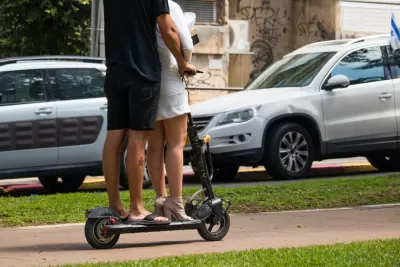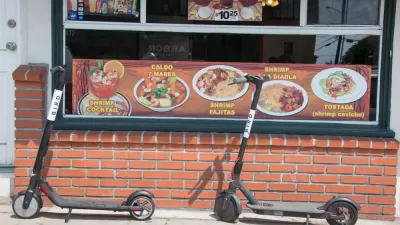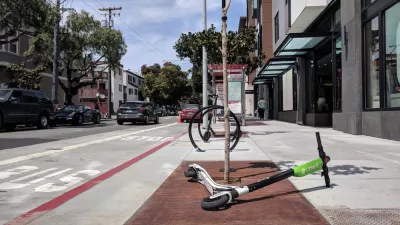Tony Dutzik, senior policy analyst with the Frontier Group, presents three environmental reasons to support shared bikes and scooters, and why cities that have adopted climate plans should accommodate these small, clean, shared vehicles.

"In my home city of Boston, you can now find an increasingly madcap array of small vehicles on the streets and sidewalks – regular bikes, e-bikes, electric scooters, hoverboards, manual and electric skateboards of various kinds," writes Dutzik in a blog post for the Frontier Group. "There are even electric unicycles."
At the same time, app-based shared mobility is making some of these new types of vehicles available to anyone with a couple of bucks and a couple of minutes to download an app. The dockless bikeshare and scooter-share revolution has come quickly – often causing controversy along the way.
All these electric (and human-powered) vehicles and devices "have radical implications for our cities, and for our efforts to curb transportation’s contribution to global warming," he writes. "The environmental case for shared electric vehicles rests on three ideas."
- First, that electric vehicles are vastly more energy efficient than internal combustion engine vehicles and can run on clean energy.
- Second, that sharing vehicles eliminates the inherent incentive to drive that comes with having a vehicle sitting in your driveway that you are already paying for.
- The third – and probably least frequently discussed – idea is that internal combustion engines and individual ownership force a design logic on our vehicles that limits our opportunities to make them more efficient.
In a lengthy April interview with The New York Times in Venice, Los Angeles, where Bird has built its new headquarters, founder and CEO Travis VanderZanden makes the equity case for sharing these vehicles.
“Not everyone can afford their own electric scooter,” he said. “We shouldn’t discriminate against people that are renting versus owning.”
His point is a valid one. In the days since the Birds, as well as the Lime and Spin scooters have disappeared from the streets of San Francisco, one can still spot occasional electric scooters in the bike lanes, but without the names of the scooter-share companies.
Last words go to Dutzik:
A future in which small-scale electric and manually-powered mobility can work its transformative magic is one in which our cities must make a bold commitment to reallocating space on our streets – giving small, slow, light vehicles at least as much priority as big, heavy ones – and renegotiating the rules of how we all get around.
FULL STORY: Scoot Over, Cars: Making Space for Small Vehicles

Planetizen Federal Action Tracker
A weekly monitor of how Trump’s orders and actions are impacting planners and planning in America.

Chicago’s Ghost Rails
Just beneath the surface of the modern city lie the remnants of its expansive early 20th-century streetcar system.

San Antonio and Austin are Fusing Into one Massive Megaregion
The region spanning the two central Texas cities is growing fast, posing challenges for local infrastructure and water supplies.

Since Zion's Shuttles Went Electric “The Smog is Gone”
Visitors to Zion National Park can enjoy the canyon via the nation’s first fully electric park shuttle system.

Trump Distributing DOT Safety Funds at 1/10 Rate of Biden
Funds for Safe Streets and other transportation safety and equity programs are being held up by administrative reviews and conflicts with the Trump administration’s priorities.

German Cities Subsidize Taxis for Women Amid Wave of Violence
Free or low-cost taxi rides can help women navigate cities more safely, but critics say the programs don't address the root causes of violence against women.
Urban Design for Planners 1: Software Tools
This six-course series explores essential urban design concepts using open source software and equips planners with the tools they need to participate fully in the urban design process.
Planning for Universal Design
Learn the tools for implementing Universal Design in planning regulations.
planning NEXT
Appalachian Highlands Housing Partners
Mpact (founded as Rail~Volution)
City of Camden Redevelopment Agency
City of Astoria
City of Portland
City of Laramie





























